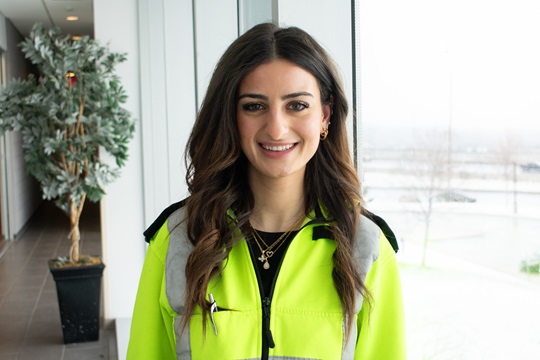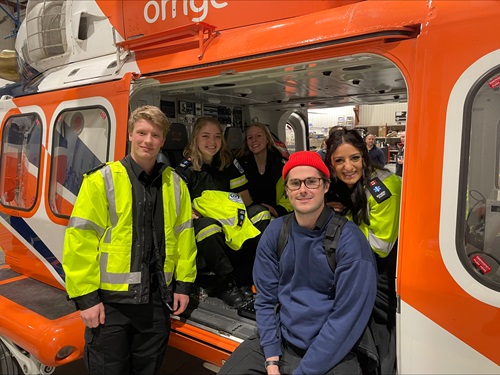Paramedic student inspired to make a difference
May 19, 2024
Paramedic Services Week is May 19 to 25. We send our deep appreciation to faculty teaching in our Paramedic and Advanced Care Paramedic programs and to all our alumni working in the field who we know bring care and compassion to their roles every day!
To mark the week, we sat down with second-year Paramedic student Alessia Luciano to hear about her Georgian experience.
What drew you to this field? Growing up, I had a lot of injuries and often dealt with paramedics. My grandfather also had health issues. He and my grandmother immigrated from Italy and didn’t speak English, so I was often the one calling 911. What struck me about that experience was that there were times I wasn’t listened to as a kid or ignored. It wasn’t often the paramedics took a moment to acknowledge or overcome language barriers. I felt as though they didn’t include me. As a result, I was unable to translate and explain to my grandmother what was going on.

Although the paramedics took good care of my grandfather, the doors would close and my family and I would be left feeling scared, confused and helpless. I knew the paramedics were just doing their job and I was grateful they were there. However, one day, I wanted to be the paramedic who made things different for families.
Growing up led me to understand that every call will be one of many for a paramedic but for the people calling us, it could be the scariest moment of their lives.
Tell us a bit about your learning journey. You really change as a person in this program. You won’t come out of it the same – and that’s because what you see and the experience you get transforms you. Faculty understand this since they’ve been there. In the first year, they guide you through how to succeed academically and, in the second year, they become a bit of a lifeline. When you’re in the field, calls happen really quick, and you move from one to the next. Our profs provide space for us to talk and unpack what we’ve been through.
In one class, we have a two-hour student-led session and explore various topics through online and in-person discussions. We ask questions we have based on things we’ve seen over the week on the road. This class creates a real sense of community. Talking about calls and experiences with people who understand feels very relieving. Your peers get your humour, feelings and are there to lean on and support you when you may have witnessed something devastating or scary. This gives us a safe place where we can learn from each other while sharing stories.
What’s the hands-on experience like? Students complete hospital placements in second and third semesters and have rideouts throughout semesters three and four. Rideouts are when you’re assigned to a preceptor who’s a full-time paramedic. You complete shifts under their schedule and take classes at the same time. Rideouts connect in-class learning to real-life patients. Many of the people I’ve had an opportunity to meet during them, including my preceptor, are Georgian Paramedic graduates!

At the end of our first year, our teachers brought us on a field trip to the Ornge helicopter base in Toronto. Ornge is an ambulance service that provides high-quality air ambulance and medical transport to patients who are critically ill or injured. Ornge has planes, helicopters and land ambulances. We had the opportunity to see an air ambulance helicopter and talk to pilots and critical care medics who work for Ornge! As a student, this was a great experience that kept us engaged and motivated. These kinds of experiences, along with simulation labs on campus, are great for learning how to work effectively and collaboratively.
What’s the greatest lesson you’ve learned in the program? Love your job but don’t let the job define your whole life. As a paramedic, you’ll face many different levels of stress every day. You’ll see more messed up things in a week than the average individual will see in a lifetime. It’s important to have hobbies and interests outside work that bring you joy. This will aid in becoming a stronger person, leading to your growth as a paramedic.
My teachers taught me the importance of taking care of yourself first and recognizing when you’re not OK. You need to take care of yourself to continue to be the paramedic who’s shining light in people’s lives. You need the ability to recharge to keep a healthy, happy mind as an individual.
How do you take care of you? I coach soccer, go to the gym, spend time with my family and friends, pick up some bartending shifts, listen to music and go to concerts – anything that helps me unwind and feel connected to myself and others.
What’s the biggest challenge you’ve faced as a student? No one really prepares you for the workload before entering the program. The first semester was hard since it’s a very heavy workload filled with new courses and material. As a student, you must learn how to manage your time effectively.
Trying to keep up with learning all the material, your school schedule, and being consistent with a workout plan and your social/family life can be overwhelming. I knew this career would be tough, but I underestimated the emotional and physical toll it would take.
Luckily, Georgian paramedic faculty really care about you not only as a student but as a person. They ground you and have really got you. The teaching staff frequently check in, make time for you whenever you need support, and validate what you’re going through. They have pulled me back to earth when I haven’t been myself; they’re the reason I’m still in this program. Having their support and compassion throughout the entire two years has made all the difference.
In fourth semester, the testing, classes, interviews and rideout shifts can build up. Even being at the end of the program, it’s easy to get overwhelmed. Remembering to look at the big picture and breathe is necessary. Personally, I put everything in my calendar to ensure I don’t double book myself. I take things one at a time and try to be fully present in whatever I’m doing.
What do you hope for the future? I want to be the kind of paramedic who approaches every call recognizing that dialing 911 is scary and although this may not be the worst thing I’ve seen, it’s someone else’s worst day.
I know I’ll be the paramedic who sees beyond the patient in front of me and makes time for the family members or other people on scene who could be in distress – providing people with information, making them feel included in the medical treatment, and using empathy in understanding that whatever is going on is not easy.
I want to be the person I needed as a kid when I called 911 for my family. Every 911 caller has their own, unique emergency; I believe understanding that is very important. Overall, I want to be the kind of paramedic who makes a positive impact on others.
What would you say to someone thinking about a career in the field? You must really want to do this, and if you want to do this – don’t be scared. Just apply!
Don’t fear not doing well! You’re human and, at some point in time, you’ll mess up. What’s important is to pick yourself back up and use all the strength and determination in you to push forward. Don’t forget to remind yourself of the end goal. Faculty often share stories of how their journey wasn’t easy either. There are bumps along the road for everyone. Don’t ever forget that we can achieve anything we set our mind too, even if it takes hard work and a few tries. You can do it. The support is here, so take my word and lean on those who’ve been in your shoes.